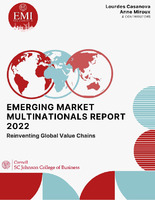Kalotay, K., Weiner, C. (2022). The impact of sanctions on Russian business abroad and Hungarian business in Russia: Parallel stories of adjustment.
In: Casanova, L., Miroux, A. (Eds.) Emerging Market Multinationals Report 2022: Reinventing Global Value Chains. Ithaca, NY: Emerging Markets Institute, S.C. Johnson College of Business, Cornell University: pp. 110-117. https://doi.org/10.7298/9j27-ng36
This chapter examines how the sanctions imposed on Russia after its 2022 invasion of Ukraine have impacted Russian firms, their direct investment abroad, and Hungarian business presence in Russia, and, in particular, how Russian and Hungarian firms have adjusted to this new reality. It highlights the main commonalities, such as the difficulties of access to finance transactions and the interruption of logistics and supply chains, especially in the areas of technology goods. The chapter also looks at the main differences between Russia and Hungary. In Russia, large firms with exposure to the West have been facing major difficulties in their international operations and have focused their efforts on mitigating the effects of sanctions. On the other side, Hungarian firms investing in and/or exporting to Russia typically try to hold their ground in the Russian market. They are attempting to overcome difficulties such as risks of foreign exchange and non-payment, issues with logistics and supply chain disruptions, problems with banking and financial transactions, increased time and costs of international shipping due to altered routing, additional administrative burdens at the border, air travel restrictions, and a constant need for information to adapt to sanctions and counter-sanctions. It is uncertain whether the generally positive attitude of Hungarian firms towards staying (and even taking advantage of the situation to expand further) will change over time. The challenges may become too great to take on, not only for smaller, resource-poor, and less-experienced firms, but also for stronger enterprises.



